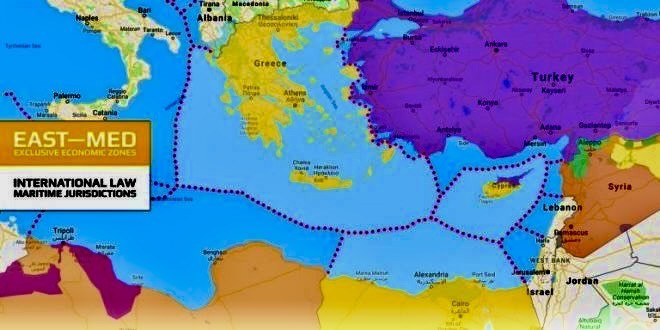
Funded by the European Commission University of Seville map of Greek marine time jurisdiction in the Aegean. Yet the Greek state of prime minister Kyriakos Mitsotakis is afraid to claim its sovereignty in the Aegean Sea lest it disturbs the “quiet waters” with Turkey. Strangely, the European Union also remains silent to the violations of EU sovereignty and the international law of the seas in the Aegean by Turkey.
The secrets of Greek demography
A Greek newspaper editor, Nikos Konstandaras, said in the midst of the country’s debt crisis, in 2013, that:
“The Greeks are in a struggle for survival. And the odds are piling up against us. The fight is not only on the economic front… that has resulted in greatly reduced incomes, higher costs and taxes, and an overriding sense of insecurity. The danger is even more basic: Deaths are outnumbering births, people are leaving the country, and the population is aging so fast that in a few decades Greece may be unable to produce enough wealth to take care of its people and may cease to be a viable nation state…. in Greece the battle for economic survival is so overwhelming that no one has time for the bigger picture…. In village after village, the elderly outnumber locals and immigrants of working age. The most frightening figure is a Eurostat projection which estimates that, in 2050, 32.1 percent of the Greek population will be over 65, compared with 16.6 percent in 2000. And this projection was made in 2007, before the crisis hit Greece’s population. We were still living high, before widespread unemployment, hasty retirement and the emigration of those with the skills to succeed abroad. New projections will most likely be much worse.”
Ten years later, in 2023, the situation, demographic and economic, didn’t improve very much, if at all. In 2023, “The Greece of today,” said the Greek demographer Byron Kotzamanis, “is very different from that of the first post-war period. Our population has increased by three million since 1951, we live much longer, we are ‘older’, we have fewer children and fewer marriages, we have many more deaths, our natural balances are negative, we divorce more easily, and we live mainly in urban centers; at the same time, our population, from previously being relatively ‘ethnically homogeneous’, now includes about 900,000 foreigners living permanently in our country. The implications of both past and expected changes are manifold, and political parties and social, professional and scientific bodies, as well as public opinion, are showing an increasing interest in both current developments and the future demographic course of Greece…. half of Greece’s population [in 2023] is concentrated in 2.9% of its total surface area [in the cities] (compared to 25.6% in the early 1950s) and two-thirds in 6.4% of the surface area (compared to 50% in 1951), while 76 out of 100 inhabitants now live in urban centers (compared to only 36 in 1951).”
Another Greek, a woman reporter, writing on June 14, 2025 had more dismal demographic news. She said young Greeks paid no attention to the aging members of the three Greek political parties. This disinterest, she implied, expressed the anxiety and fear of most people in Greece. A fear the country is slowly but steadily moving towards extinction. Too many elderly Greeks die but they are not being replaced by the birth of Greek babies. “People [in Greece] live in an unreliable environment,” says Maria Katsounaki, “with everyday life being full of suffocating puzzles of survival.”
I would not call obstacles and dangers to human survival “puzzles,” but the message is clear. Greeks in 2025 are and feel insecure because their government often acts like a subsidiary of foreign interests, including those of enemy Turkey. As for the “international setting,” the reporter spoke about barrages of “successive shocks and unpredictable developments.”
Why are villages declining?
However, the worst calamity that keeps Greece under constant “suffocating” traumas has been the near disappearance of the countryside. Despite the thousands of villages, Greece has pretty much abandoned many of them. Or, rather, villages are emptying and become invisible.
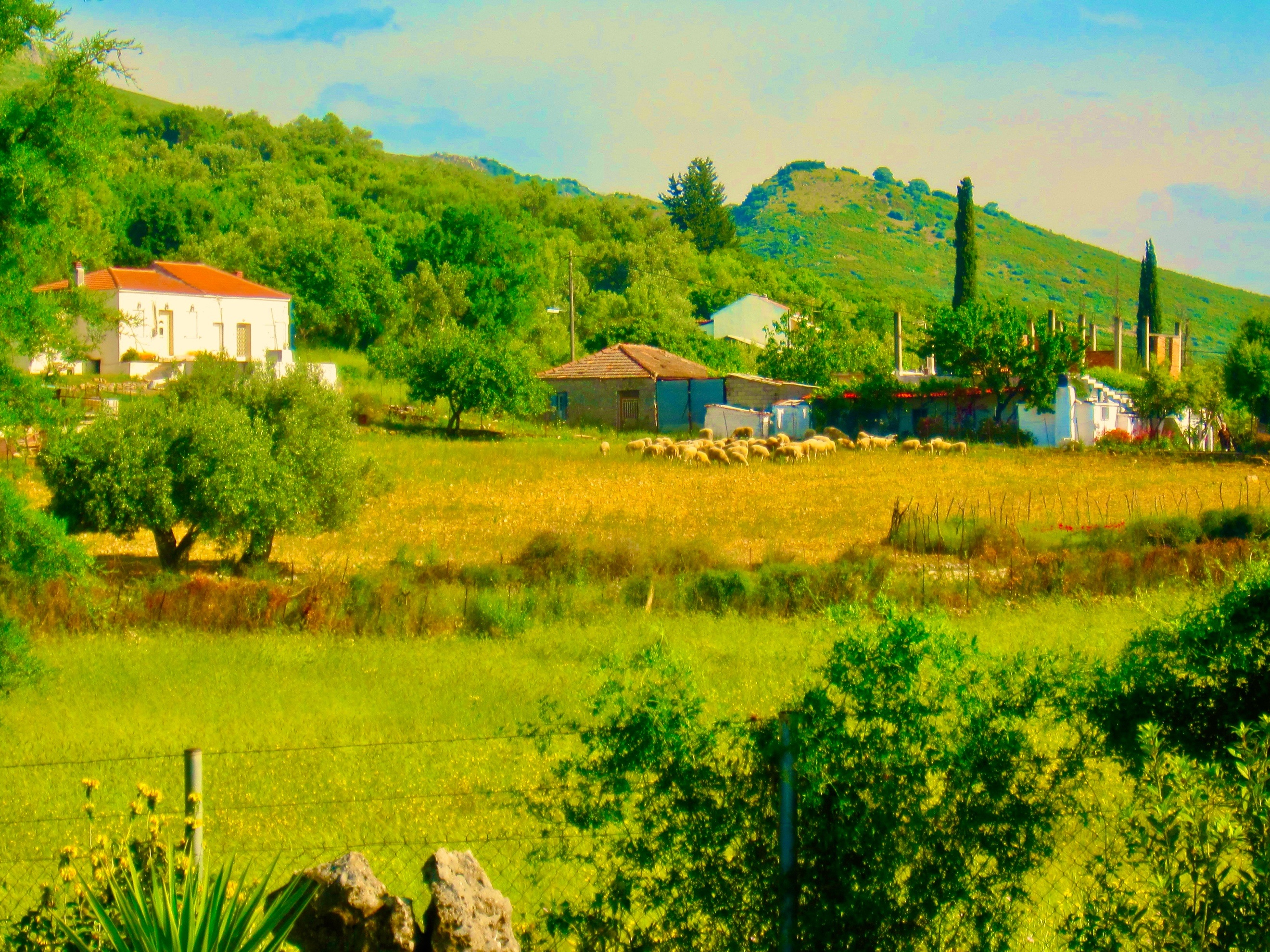
Machairas: a beautiful village in Central Greece, growing sheep, olive trees, gardens, and other food crops. Photo: Evaggelos Vallianatos
The loss of villages is by far the most painful and revolutionary and lasting upheaval in Greek history. Greece without villages is inconceivable. Even Athens of the fifth century BCE was a large Attica village Aristotle called polis. How did this happen?
Foreign crusading wars
The volcano erupted with the Nazi Germans in Greece, April 1941-October 1944. The Germans continued the destruction of the Christian crusaders of 1204.
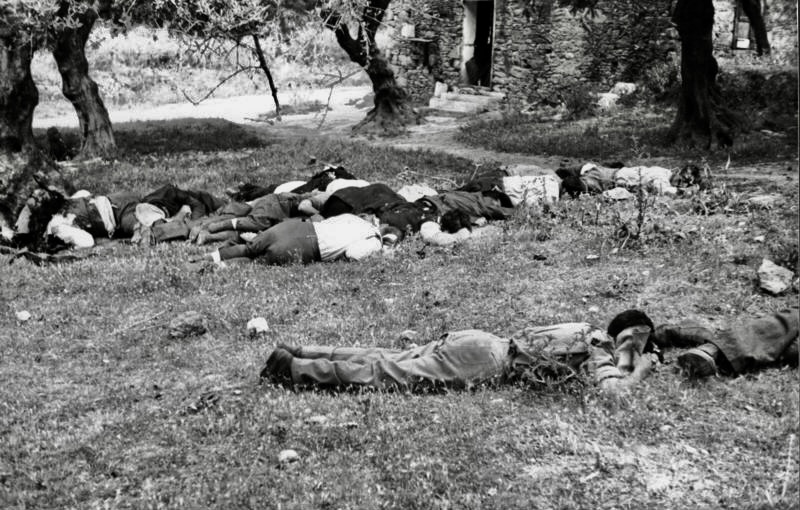
Germans shooting civilians in Kondomari, Crete, June 2, 1941. Dead Cretans. Franz Peter Weixler. Wikipedia Commons
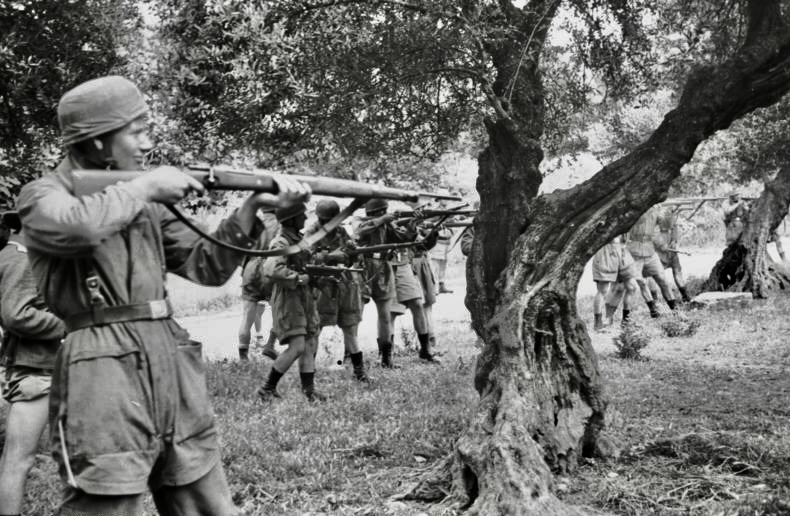
The Germns put in motion a looting and extermination campaign not much different than that of the 1204 European crusaders. They shredded the country, giving it to Bulgarians, Italians and keeping the largest and most strategic parts of Greece for themselves. In addition, the Germans imitated the genocidal policy of Turkey, which used mass murder against the Armenians and Greeks who lived in Turkey in early twentieth century. The Germans wiped out about a thousand Greek villages, shot dead thousands of fighters who resisted their brutal occupation, confiscated and killed domesticated animals, blew up the country’s railroads, harbors, bridges, roads, destroyed public transportation, the merchant marine, and fishing. Nazi Germany made famine and starvation the epicenter of its strategy for killing Greece. And last but not least, German occupiers looted the country’s archaeological treasures.
Because Germany was losing the war and could not complete its extermination plan in Greece, German officers and those of Britain agreed Greece should cease to exist, war or not war. And what a better way than funding Greeks killing Greeks, exactly like the proposal of the Athenian general Alcibiades who urged the Persians to keep funding Spartans killing Athenians during the Peloponnesian War, 431-404 BCE. Germans and British had read Thucydides. They have been sowing the seeds for Greek conflict and civil war ever since. Nevertheless, the Greek Civil War, 1946-1949, spread the lava of brother killing brother further.
The British-dominated post-WWII Greek monarchical government did not punish the Greeks who collaborated and served the Germans. In some measure, they rewarded them with government employment in the army of the country. Furthermore, the British labeled “communists” the Greek Liberation Front (EAM) soldiers who fought the Germans and freed most Greece. The British funded another group of Greek fighters who also fought the Germans. As early as 1943, they made it clear they would continue to fund them if they declared war against the so-called EAM communists, thus sparking the destructive Greek civil war. The British invited the Americans, and Greece remains still under the influence of the Western European states, primarily, America.
The civil war devastated even more the German-annihilated Greece. It also left a divided and wounded country. The misguided Greek “communists” assassinated two brothers of my father and a sister of my mother.
The perennial enemies
The Turks kept watching carefully the bleeding country next door, Greece. They had done the same thing for centuries upon their arrival in Asia Minor sometime in the eleventh century from Mongolia. Moslem Turkey is no ordinary country. It is certainly not a Western country. It fought the West for centuries. It is the remnant of Mongol Ottoman empire that enslaved southeastern European countries, including Greece. But America, convincing itself it won WWII, dismissed this inconvenient history and drafted both Turkey and Greece into its NATO military alliance in order to fight nuclear weapons-armed Soviet Union / Russia. That meant, like in the case of Britain, devotion to Turkey. The result of this pro-Turkish policy was, primarily, arming Turkey and rewarding it with Greek territory. Cyprus was the first sacrificial lamb. In 1974, America ordered Greece to do nothing while Turkey invaded northern Cyprus, thus giving Turkey about 40 percent of the Greek island. Britain was also pleased with this Turkish return to Cyprus because it satisfied its duplicitous policy of divide and rule and, just as important, it gave Britain a chance to take revenge against the Greeks of Cyprus who defeated its troops in the 1950s. Britain tried unsuccessfully to crush Cypriot Greek resistance to its brutal colonial control. The Cypriots wanted union with Greece. Britain said no to the union of Cyprus and Greece and brought the Turks to Cyprus. It convinced America to give Turkey permission to capture northern Cyprus.
The war over debt
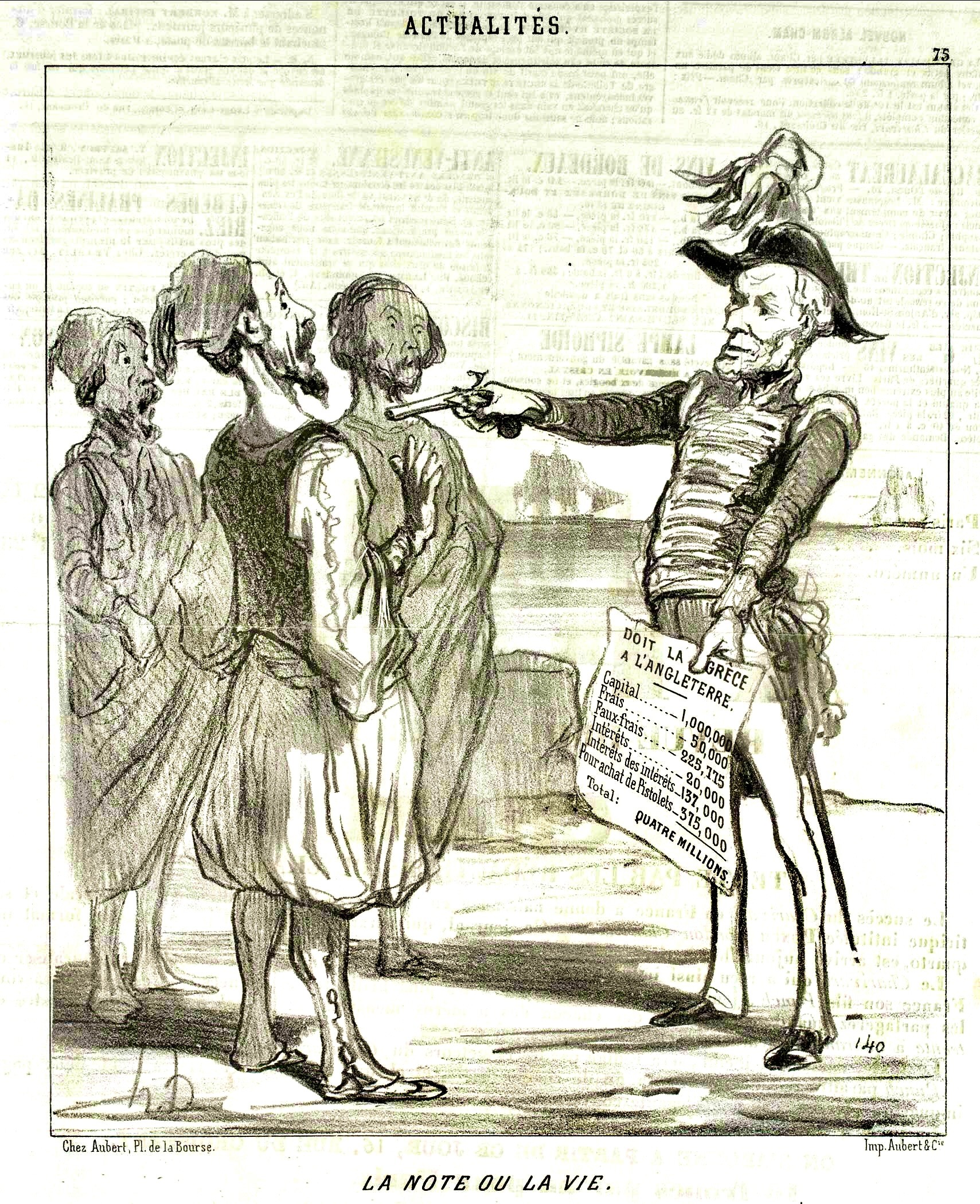
La Note Ou La Vie, Money or Your Life by Honore Daumier, Feb. 15, 1850. LACMA, Public Domain
All these resentments and fears came to a head, once again, when the American financial tsunami hit the global markets in 2008. The Greek debt, real and manufactured, exploded, and Greece was thrown to the merciless hands of the European Union and America’s International Monetary Fund. These two powerful Western and NATO-guided institutions treated indebted Greece like an enemy. They put the country at least 30 years behind, sold its state assets (railroads to Italy, telephones and airports to Germany, the country’s largest harbor, Piraeus, to China) and forced WWII-German-like austerity / hunger on the Greek population. The traumas of German occupation reappeared and peaked during the debt war, 2009-2020. Behing these military, political, and financial and social violent transformations were foreigners. They almost dissolved Greece. They reiterated there was no connection between modern Greeks and ancient Greeks. Germany headed this attack against Greece.
That’s why Greeks stopped having kids, those with advanced academic degrees and skills leaving the country and allowing foreign bankers to run it like a slave colony. The real beneficiary of this harsh treatment of Greece was Germany and Turkey. It’s as if the EU-IMF-NATO conglomerate decided to cripple Greece and, indirectly, gift it to Turkey.
Strategy for a viable Greek nation state
So, yes, demography matters. It mirrors unacceptable foreign influence and local political leadership married to such treasonous foreign control that even included Turkey. For example, the Greek government in 2021, the 200-year anniversary of the Greek Revolution of 1821, invited foreign “scholars” who denigrated the Greek Revolution and denied any connections between ancient and modern Greeks. The result of this racist and tragic anti Hellenic advertisement of the government of Greece is that the rulers of Greece, like the kings Western European powers imposed on Greece, are not Greek in any definition of the word Greek. They advocate anti Greek ideas that are hostile to Greek identity, sovereignty, self-reliance, prosperity and national defense. They rather be anything but Greek. That also explains the pathology of the Greek prime minister Kyriakos Mitsotakis of maintaining “calm waters” in the Aegean with Turkey while the Turks are claiming the Aegean as their blue homeland. The Turkish fear of Mitsotakis is embarrassing. You cannot respect or be friendly to your enemy. Greece cannot even connect Crete with Cyprus with an underwater cable because Turkish warships claim the sovereignty of Greek Aegean. And despite this overt hostility of Turkey, Mitsotakis keeps talking to the dangerous president of Turkey Erdogan, while Erdogan is telling Mitsotakis and the Greek government and NATO he intends to capture half of the Greek Aegean islands.
The Western European and American allies of Greece see Mitsotakis and Erdogan embracing and perhaps dismiss Turkish aggression in the Aegean as some kind of a joke between Erdogan and Mitsotakis. Such behavior is unconscionable and extremely offensive, dangerous and humiliating. The EU and NATO countries and, of course, America, know the strategy of Turkey, that it is aggressive, that it violates Greek and EU sovereignty as well as the law of the seas, and possibly may blow up NATO. But they are doing nothing, save for taking the side of Turkey, exactly like the policy of Britain since the nineteenth century.
I always thought that America was behind the Turkish humiliations of Greece and violations of international law in Cyprus and the Aegean. America is preparing the ground for another 1974 Turkish grab of Greek territory. Trump has sent an envoy to Turkey in order to help Turkey and Greece divide the Greek Aegean between them or give the entire Aegean to Turkey.
Changing this stupid and hostile American policy against Greece will not be easy. Trump is hooked on personal profits. And Greece has very little to offer him. Second, removing the present Ephialtes, Greek political traitors governing Greece, will also be very difficult. But it can be done.
The only movement that legitimately may win the next elections is the one emerging from the train tragedy near Tempe, Larissa, Thessaly. On February 28, 2023, a passenger train travelling north from Athens to Thessalonike and carrying 342 people, mostly college students, crashed head on with a freight train travelling southward on the same track. Kostas Genidounias, chief of the union of train drivers said to a state television that “nothing works, everything is done manually, neither the signals nor the traffic control system worked.”
We mentioned that the EU-IMF sold the Greek trains to an Italian company. Certainly, such a colonial act must have offended the Greek workers serving the trains and, most likely, weakened and perhaps irreparably wrecked the management and operations of Greek trains. But the unique consequence of the Tempe tragedy is that it had a massive and profound political impact. On February 28, 2025, two years after the fatal accident at Tempe that killed 57 people and injured 180, hundreds of thousands of Greeks protested in Athens and Thessalonike as well as in more than 360 cities all over the country – and a few countries abroad.
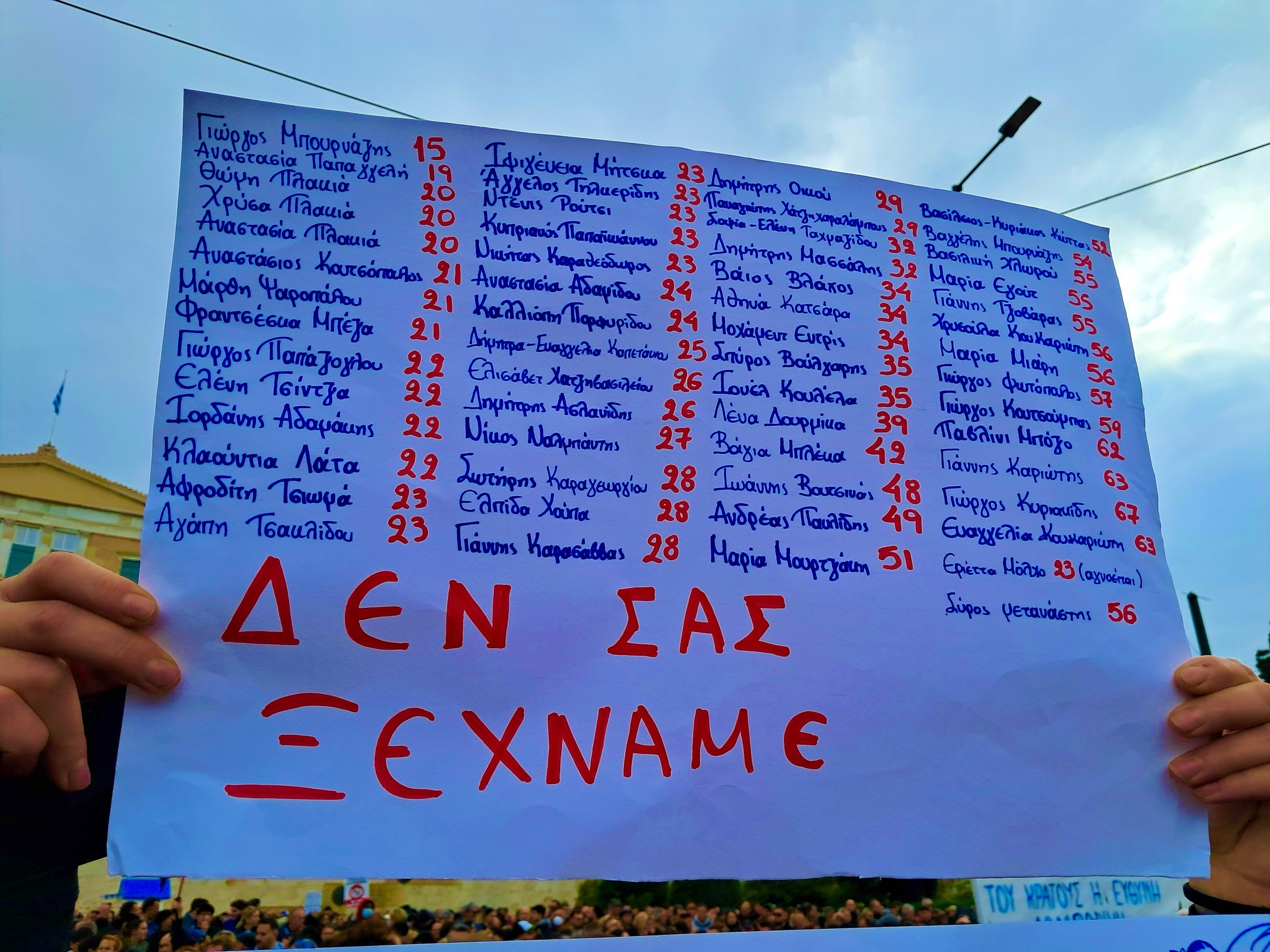
“We Don’t Forget You”: poster, Feb. 28, 2025 listing the names of the dead from the head on collision of trains near Tempe, Larissa, Thessaly, Feb. 28, 2023. Photo: Nikos Likomitros. Creative Commons, Wikipedia
The protesters expressed outrage and demanded punishment for the guilty. They want to see justice done. Banners warned the government that “We don’t forget, and we don’t forgive.” Maria Krystianou, pediatrician and mother of a 21-year old daughter who died at the train crash, said to the crowd: “For those of us who had our children and loved ones on that train, a part of us remains with them and will never return. The unrelenting pain and the unimaginable reality are with us forever,”
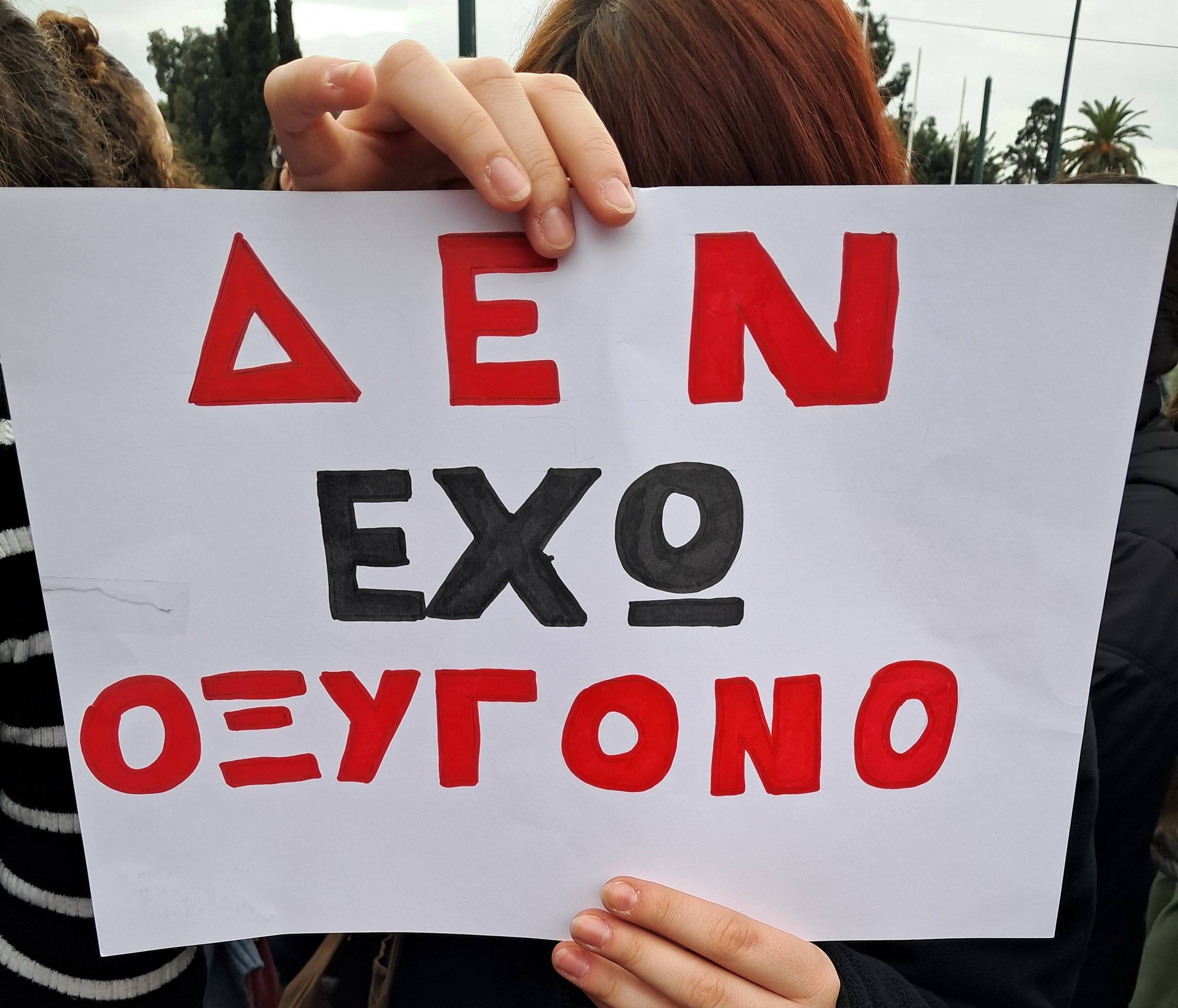
“I Don’t Have Oxygen” poster, Feb. 28, 2025. The meaning is that the train accident was a crime. Nikos Likomitros. Creative Commons, Wikipedia
Krystianou is likely to be the beneficiary of the widespread public resentment for government corruption that killed and injured dozens of young Greek students. Other patriotic Greeks who love their country need to join Krystianou to form a coalition to win the next election. They would need to promise to punish all responsible for this shameful and deadly and criminal accident, including prime minister Mitsotakis and his transportation minister Konstantinos Karamanlis who, conveniently, resigned the same day the accident took place. The rest of the agenda of the new government ought to include the following policies.
Reform public education so that young Greeks learn Greek history and master written and spoken Greek, both ancient and modern. Homer and other great poets, historians, scientists, engineers and philosophers ought to be taught in the original to Greek students from very young age.
Return to the villages to practice farming without the toxic covers of imported foreign industrialized agriculture. Fund young couples to have several children while working the land or doing other work in the village or nearby town. Births must exceed deaths to put a brake on the dismal arithmetic of demography and the abandonment of the villages. Moreover, ecological Greek farming would fight climate chaos, which threatens not merely Greece but the planet. In addition, Greece must find ways to prosper without the use of fossil fuels. The Sun was a god among their ancient ancestors. Why not return to that philosophy by taking the energy of the country from the Sun? Increase and make free public transport all over the country to eliminate most of the cars and their toxic pollution? In other words, join ancient Greek wisdom of the virtues of pure water, air and fertile land and bountiful natural world. Employ modern science and technology, which are also advanced versions of Greek knowledge.
Greece must also become self-reliant in food no less than producing all the weapons it needs for national defense – in Greece. The new Greek government ought to work closely with Greek shipowners to revive shipbuilding at home. And with their assistance and the help of the international community, the new government should be able to persuade or force Germany to finally pay war reparations for the forced loan, war crimes and atrocities their Nazi ancestors extracted and committed in Greece, including the return of thousands of Greek archaeological treasures the Nazis stole from Greece. Economists have figured out the Germans owe Greece about a trillion euros.
Finally, since war is unlikely to cease, Greece ought to be ready for war in order to avoid it. Turkey only understands force. A strong and self-reliant Greece would not have to worry about the Turks. And a strong Greece would no longer raise questions of whether or not Greece is a viable nation state. Economic and military and, above all, civilization strength is the best antidote to the states of NATO overrating Turkey, which remains a jihadist country, completely unreliable, with genocidal impulses that neutralize civilization.
Greece, on the other hand, is a civilization superpower. With the money Greece would receive from Germany and, potentially, from shipowners, the country could easily improve its economy; end its debt, and increase its population while protecting its borders from illegal migrants dumped to its islands from enemy Turkey. Under no circumstances should Greece accept the Moslem migrants from Germany. Germany should repatriate them.
The potentials for Greece are limitless. It could become the solar energy example of Europe, manufacture solar panels and install them on the roofs of homes. Greece could also become the school of civilization and peace, which Alexander the Great and Ioannes Kapodistrias, its first president in modern times, dreamed.
The post Is Greece Becoming a Non-Viable Nation State? appeared first on CounterPunch.org.
This post was originally published on CounterPunch.org.